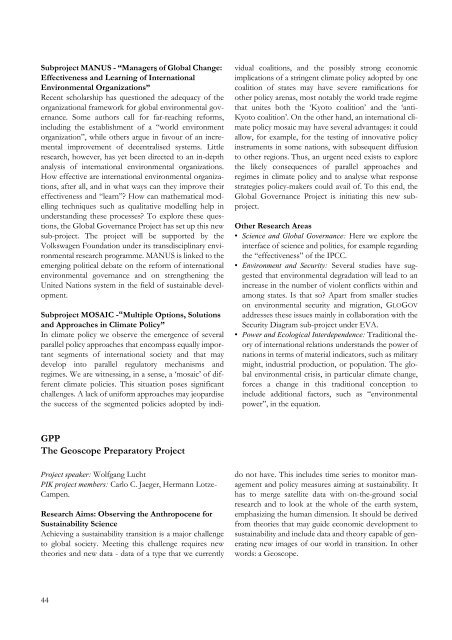PIK Biennial Report 2000-2001 - Potsdam Institute for Climate ...
PIK Biennial Report 2000-2001 - Potsdam Institute for Climate ...
PIK Biennial Report 2000-2001 - Potsdam Institute for Climate ...
You also want an ePaper? Increase the reach of your titles
YUMPU automatically turns print PDFs into web optimized ePapers that Google loves.
Subproject MANUS - “Managers of Global Change:<br />
Effectiveness and Learning of International<br />
Environmental Organizations”<br />
Recent scholarship has questioned the adequacy of the<br />
organizational framework <strong>for</strong> global environmental governance.<br />
Some authors call <strong>for</strong> far-reaching re<strong>for</strong>ms,<br />
including the establishment of a “world environment<br />
organization”, while others argue in favour of an incremental<br />
improvement of decentralised systems. Little<br />
research, however, has yet been directed to an in-depth<br />
analysis of international environmental organizations.<br />
How effective are international environmental organizations,<br />
after all, and in what ways can they improve their<br />
effectiveness and “learn”? How can mathematical modelling<br />
techniques such as qualitative modelling help in<br />
understanding these processes? To explore these questions,<br />
the Global Governance Project has set up this new<br />
sub-project. The project will be supported by the<br />
Volkswagen Foundation under its transdisciplinary environmental<br />
research programme. MANUS is linked to the<br />
emerging political debate on the re<strong>for</strong>m of international<br />
environmental governance and on strengthening the<br />
United Nations system in the field of sustainable development.<br />
Subproject MOSAIC -“Multiple Options, Solutions<br />
and Approaches in <strong>Climate</strong> Policy”<br />
In climate policy we observe the emergence of several<br />
parallel policy approaches that encompass equally important<br />
segments of international society and that may<br />
develop into parallel regulatory mechanisms and<br />
regimes. We are witnessing, in a sense, a ‘mosaic’ of different<br />
climate policies. This situation poses significant<br />
challenges. A lack of uni<strong>for</strong>m approaches may jeopardise<br />
the success of the segmented policies adopted by indi-<br />
GPP<br />
The Geoscope Preparatory Project<br />
Project speaker: Wolfgang Lucht<br />
<strong>PIK</strong> project members: Carlo C. Jaeger, Hermann Lotze-<br />
Campen.<br />
Research Aims: Observing the Anthropocene <strong>for</strong><br />
Sustainability Science<br />
Achieving a sustainability transition is a major challenge<br />
to global society. Meeting this challenge requires new<br />
theories and new data - data of a type that we currently<br />
44<br />
vidual coalitions, and the possibly strong economic<br />
implications of a stringent climate policy adopted by one<br />
coalition of states may have severe ramifications <strong>for</strong><br />
other policy arenas, most notably the world trade regime<br />
that unites both the ‘Kyoto coalition’ and the ‘anti-<br />
Kyoto coalition’. On the other hand, an international climate<br />
policy mosaic may have several advantages: it could<br />
allow, <strong>for</strong> example, <strong>for</strong> the testing of innovative policy<br />
instruments in some nations, with subsequent diffusion<br />
to other regions. Thus, an urgent need exists to explore<br />
the likely consequences of parallel approaches and<br />
regimes in climate policy and to analyse what response<br />
strategies policy-makers could avail of. To this end, the<br />
Global Governance Project is initiating this new subproject.<br />
Other Research Areas<br />
• Science and Global Governance: Here we explore the<br />
interface of science and politics, <strong>for</strong> example regarding<br />
the “effectiveness” of the IPCC.<br />
• Environment and Security: Several studies have suggested<br />
that environmental degradation will lead to an<br />
increase in the number of violent conflicts within and<br />
among states. Is that so? Apart from smaller studies<br />
on environmental security and migration, GLOGOV<br />
addresses these issues mainly in collaboration with the<br />
Security Diagram sub-project under EVA.<br />
• Power and Ecological Interdependence: Traditional theory<br />
of international relations understands the power of<br />
nations in terms of material indicators, such as military<br />
might, industrial production, or population. The global<br />
environmental crisis, in particular climate change,<br />
<strong>for</strong>ces a change in this traditional conception to<br />
include additional factors, such as “environmental<br />
power”, in the equation.<br />
do not have. This includes time series to monitor management<br />
and policy measures aiming at sustainability. It<br />
has to merge satellite data with on-the-ground social<br />
research and to look at the whole of the earth system,<br />
emphasizing the human dimension. It should be derived<br />
from theories that may guide economic development to<br />
sustainability and include data and theory capable of generating<br />
new images of our world in transition. In other<br />
words: a Geoscope.

















